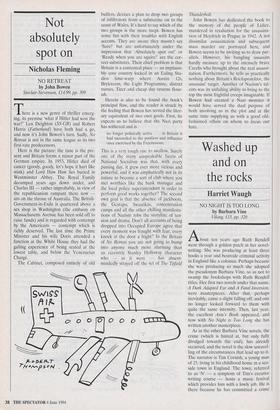Not absolutely spot on
Nicholas Fleming
NO RETREAT by John Bowen
Sinclair-Stevenson, £14.99, pp. 309
here is a new genre of thriller emerg- ing, its premise 'what if Hitler had won the war?' Len Deighton (SS-GB) and Robert Harris (Fatherland) have both had a go, and now it's John Bowen's turn. Sadly, No Retreat is not in the same league as its two first-rate predecessors.
Here is the picture: the time is the pre- sent and Britain forms a minor part of the German empire. In 1953, Hitler died of cancer (goody, goody, let's hope it hurt like stink) and Lord Haw Haw lies buried in Westminster Abbey. The Royal Family decamped years ago down under, and Charles III — rather improbably, in view of the republicanism rampant there now sits on the throne of Australia. The British- Government-in-Exile is quartered above a sex shop in Washington (the embassy on Massachusetts Avenue has been sold off to raise funds) and is regarded with contempt by the Americans — contempt which is richly deserved. The last time the Prime Minister and his wife Doris attended a function at the White House they had the galling experience of being seated at the lowest table, and below the Venezuelan Chargé.
The Cabinet, composed entirely of old buffers, devises a plan to drop two groups of infiltrators from a submarine on to the coast of Wales. It's hard to say which of the two groups is the more inept. Bowen has some fun with their troubles with English accents. They are aware they mustn't say `Sure!' but are unfortunately under the impression that 'Absolutely spot on or `Ready when you are squire!' are the cor- rect substitutes. Their chief problem is that Britain is a contented place — an implausi- bly cosy country locked in an Ealing Stu- dios time-warp where Austin 12s, Brylcreem, the Light Programme, district nurses, Tizer and cheap day returns flour- ish.
Herein is also to be found the book's principal flaw, and the reader is struck by the feeling that Bowen has scored the liter- ary equivalent of two own goals. First, he expects us to believe that the Nazi party has withered and is
no longer politically active . . . in Britain it had succeeded to the position and influence once exercised by the Freemasons.
This is a very tough one to swallow. Surely one of the many unspeakable facets of National Socialism was that, with every passing day, it grew ever more vicious and powerful, and it was emphatically not in its nature to become a sort of club where you met worthies like the bank manager and the local police superintendent in order to perform good works together? The second own goal is that the absence of jackboots, the Gestapo, Swastikas, concentration camps and all the other chilling manifesta- tions of Nazism robs the storyline of ten- sion and drama. Don't all accounts of being dropped into Occupied Europe agree that every moment was fraught with fear, every knock at the door a fright? In the Britain of No Retreat you are not going to bump into anyone much more alarming than an eccentric Stanley Holloway character who — as it were — has absent- mindedly strayed off the set of The Titfiekl
Thunderbolt.
John Bowen has dedicated the book to the memory of the people of Lidice, murdered in retaliation for the assassina- tion of Heydrich in Prague in 1942. A not dissimilar assassination and subsequent mass murder arc portrayed here, and Bowen seems to be inviting us to draw par- allels. However, his bungling assassins hardly measure up to the intensely brave Czechs who brought about the real assassi- nation. Furthermore, he tells us practically nothing about Britain's Reichsprotektor, the assassins' target. Another of Nazism's tal- ents was its unfailing ability to bring to the top the most frightful creeps imaginable. If Bowen had created a Nazi monster it would have served the dual purpose of both involving us in the plot and at the same time supplying us with a good old- fashioned villain on whom to focus our hate.


























































 Previous page
Previous page